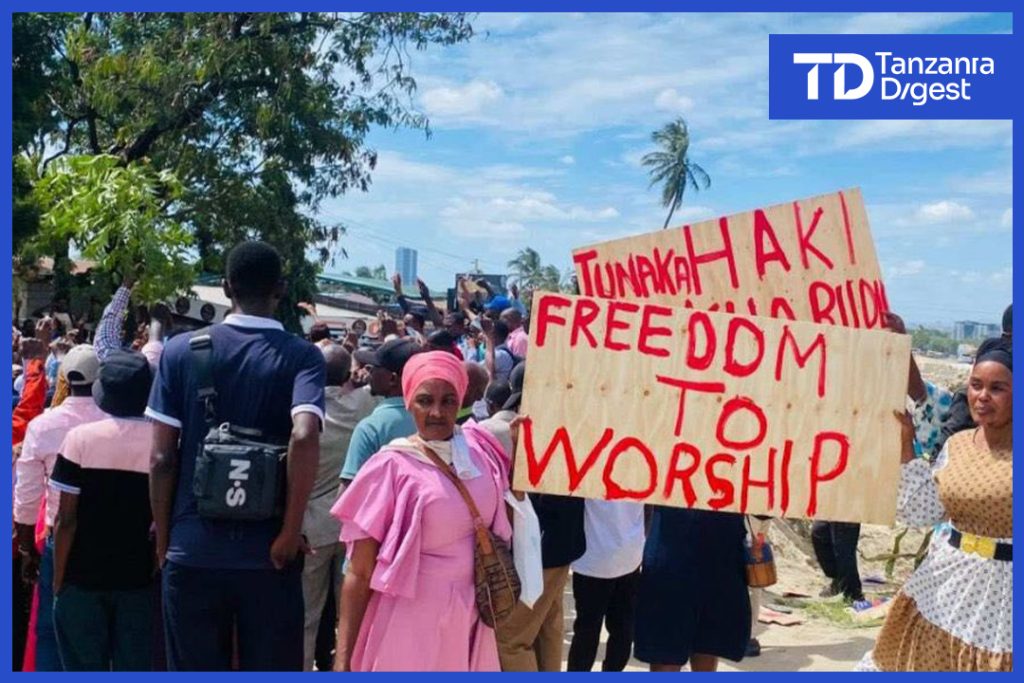52 members of the Ufufuo na Uzima Church opened a constitutional case challenging the termination of their rights to worship.
On 11th July 2025, the AG and the IGP will have their hands full responding to a complaint that they have illegally truncated the rights of the Ufufuo na Uzima Church’s constitutional rights to worship.
The Church was closed by the registrar of societies on 02nd July 2025. This unprecedented action was retaliation against the leader of the Church, Bishop Gwajima’s stance against abductions, torture, and murders.
A preliminary objection has been raised over the names of the parties. The Ag claims the litigant lacks “locus standi” to lodge a complaint since it has never been served with the Registrar’s letter to cease operating.
The name that lodged a complaint in the High Court was Glory of Christ Church rather than Glory Church of Tanzania.
The court will have to determine whether these preliminary proceedings befit seizing the root of the matter.
In another layer of confusion, the registrar of societies is alleged to have written another letter claiming he wasn’t the author of the letter that barred the Church.
Who really closed the church? Why do the names of the churches keep morphing? Is there something behind the curtain?
What the eye struggles to see.
The constitutional case brought by 52 members of Ufufuo na Uzima Church (also known as Glory of Christ Tanzania Church) against the Tanzanian government exposes a complex web of legal contradictions, political retaliation, and systemic suppression of religious freedom. Below is a structured analysis of the key issues:
⚖️ 1. Name Discrepancies & Legal Identity Crisis.
– Morphing Names in Official Documents:
The church is deregistered as “Glory of Christ Church” in the initial letter, but its legally registered name is “Glory of Christ **Tanzania** Church“. This discrepancy allowed the state to claim the litigants lack “locus standi” (legal standing) since the named entity in the complaint does not match official records.
– Registrar’s Denial of Authorship:
The Registrar of Civil Societies disowned the deregistration letter, calling it “unsigned,” “illegitimate,” and addressed to a non-existent entity. This creates a Kafkaesque scenario where police enforce a “non-existent” order while the church is barred from challenging it procedurally.
🚨 2. Due Process Violations & Accountability Vacuum.
– Unserved and “Ghost” Documents:
The Attorney General (AG) argues no formal notice was served to the church, rendering enforcement illegal. Yet police physically sealed the premises, arrested worshippers, and used tear gas against congregants praying outdoors.
– Bureaucratic “Herod and Pilate” Dynamic:
The Registrar and Ministry of Home Affairs shifted blame, with the Minister calling the deregistration letter “speculative” and refusing to process an appeal due to “confusion” over the church’s identity. This circular evasion mirrors biblical accounts of authority dodging responsibility (hence the “Herod and Pilate” analogy).
⛓️ 3. Political Retaliation Against Dissent.
– Trigger: Gwajima’s Anti-Abduction Stance:
The church was deregistered days after Bishop Gwajima condemned state-linked abductions and disappearances, asking how authorities would react “if victims were leaders’ children“.
– Ruling Party’s Hostility:
President Samia Suluhu publicly warned CCM (the ruling party) against “Gwajimanization” – her term for Gwajima’s brand of dissent – framing it as a threat to party discipline. This signaled open season on Gwajima’s institutions.
– Pre-Election Suppression:
The crackdown aligns with Tanzania’s pattern of silencing critics before elections (scheduled for October 2025), using the “Societies Act” to bypass judicial review.
📜 4. Constitutional & Human Rights Implications.
– Freedom of Worship Violations:
Article 19 of Tanzania’s Constitution guarantees religious freedom, yet 70,000 congregants are barred from worship, and affiliate churches nationwide are shuttered.
– Collective Punishment:
Religious leaders across denominations – including Muslims and Lutherans – criticized the punishment of entire congregations for their leader’s speech. As Sheikh Khalifa Khamis stated:
> “Shutting down a church makes believers lack a place to pray… punishing the congregation for a mistake committed by their leader is not fair“.
– International Law Breaches:
Tanzania’s ratification of the “International Covenant on Civil and Political Rights” obligates it to protect religious assembly, making the ban actionable in global forums.
🔍 Who Closed the Church? The “Invisible Hand”
While the Registrar initiated the deregistration, the enforcement cascade – police blockades, tear-gassing, and arrests – points to “executive coordination” between the Ministry of Home Affairs, police, and the ruling party (CCM). The name discrepancies and disavowed documents suggest a deliberate strategy to create legal chaos, paralyzing the church’s recourse.
Table: Key Name Variations in the Crisis.
| No. | Document/Source. | Name Used. | Legal Validity. | Purpose. |
| 1.0 | Registrar’s Deregistration. | “Glory of Christ Church”. | Invalid (unsigned; wrong name). | Justify enforcement without due process. |
| 2.0 | Church’s Legal Registration. | “Glory of Christ **Tanzania**. | Valid (official registration). | Defend against deregistration. |
| 3.0 | High Court Petition. | “Glory of Christ Church”. | Rejected (name mismatch). | Block legal challenge on technicality. |
💎 Conclusion: The July 11 Hearing as a Crossroads.
The preliminary objections over names and “locus standi” are “tactical delays” to avoid addressing the state’s suppression of constitutional rights. The court must:
1. “Reject procedural evasion” and examine the state’s substantive violations of religious freedom.
2. “Compel disclosure” of who authorized police actions if the deregistration letter is “illegitimate.”
3. Uphold the “audi alteram partem” principle by allowing the church to defend itself.
As Bishop Bagonza warned:
> “The state should not dictate the content or direction of worship“.
The outcome will test whether Tanzania’s judiciary can curb executive overreach – or enable its descent into authoritarianism.
Read more analysis by Rutashubanyuma Nestory

